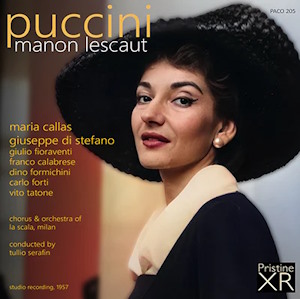
Giacomo Puccini (1858-1924)
Manon Lescaut – opera in four acts (1893)Manon Lescaut – Maria Callas (soprano)
Des Grieux – Giuseppe di Stefano (tenor)
Lescaut – Giulio Fioravanti (baritone)
Geronte – Franco Calabrese (bass)
Edmondo – Dino Formichini (tenor)
Una voce sola – Fiorenza Cossotto (mezzo-soprano)
L’oste – Carlo Forti (baritone)
Il maestro di ballo – Vito Tatone (tenor)
Un sergente degli arcieri – Giuseppe Morresi (baritone)
Lampionaio – Franco Ricciardi (tenor)
Un comandante di Marina – Franco Ventriglia (bass)
Chorus & Orchestra of La Scala, Milan/Tullio Serafin
rec. 18-27 July 1957, Teatro alla Scala, Milan
Pristine Audio PACO205 [2 CDs: 121]
I recently reviewed and recommended Pristine’s remastering into Ambient Stereo of the 1954 Decca recording of Manon Lescaut with Tebaldi and Del Monaco and remarked that it was one of my two top recommendations for a studio, stereo version in my survey. This latest release of the 1957 EMI studio account with Callas and Di Stefano from the Pristine stable was one of my two recommended mono versions, so its transformation into Ambient Stereo now puts it on more of an equal footing, sonically speaking, that is; artistically, it was always on a par – how could it be otherwise with such a cast?
I quote here from my verdict in that survey:
“This was Callas’ last La Scala recording, made in July 1957 after a punishing recording schedule including Turandot; we are fortunate to find her and Di Stefano in such splendid voice knowing how soon they would both start running into more serious and frequent vocal difficulties. Callas’ mentor Serafin is in good form, too; fleet and light in the bustling crowd scenes and indulgently permissive of rallentandos for his singers in plush outpourings like “Donna non vidi mai”. This technique of placing intimate reflective revelations of inner thoughts against frenetic action is almost a cliché – or at least a trademark trope – in Puccini’s operas, but he is such a skilled craftsman it works every time, whether in La Bohème, La rondine or Turandot, and here it exercises its magic as he homes in on the feisty protagonist and the naive hero gamely battling against worldly cunning. Casting is from strength, the diction of all concerned is a joy. Baritone Giulio Fioravanti is little remembered but he was also very fine in Tebaldi’s Adriana Lecouvreur recorded in 1961. Dino Formichini is good but not as charming as De Palma for Decca – but Fiorenza Cossotto makes her mark in her little cameo role. The two principal singers are in good form: Di Stefano is a really credible, impassioned des Grieux, making the most of the words and singing out thrillingly, although occasionally his tone turns “white” and “shouty” – unlike the young Del Monaco, who is vocally phenomenal. It is also apparent that Callas is singing carefully and even holding back a little in the earlier two Acts but this is could be as attributable to characterisation as caution; she is a credible ingénue; the morbidezza of “in quelle trine morbide” is enchanting, the flap on the B flats less and some curdled high notes less so. Her lower register is brought in to devastating effect in the final scene and the culminating tragedy is deeply affecting, both singers giving it their emotional all. However, I don’t see that the flaws are any more salient than those in recordings Walter Legge sanctioned for immediate release and in many ways this one is artistically superior.”
Of course, the big difference now lies in the question of the newly refurbished sound. My comparison is not only with the 2014 mono CD as issued in the recent complete, La Divina box set, but also a 1972 “stereo remastering” – presumably “electronically reprocessed”? – by Ars Vocalis Opera Studio. I first duly sampled all three in succession, starting with the mono version and was surprised by how primitive that sounds – though, as ever, the ear soon adjusts. I moved on to the Ars Vocalis stereo version and immediately found it to be a great improvement – somewhat over-reverberant and still a bit thin but much more present. The Pristine remastering too, is rather clangourous, but the boosting of the bass frequencies and the general sense of space make it clearly the best listening experience. To be sure, I retraced my steps in reverse: and indeed, both the manufactured stereo recreations are much more pleasant on the ear and I am still not sure whether I don’t prefer the halfway-house warmth of the Ars Vocalis remastering over the almost startlingly forensic immediacy of Pristine’s; certainly, both are preferable even to the work of the Art et Son studio on the original mono recording, which emerges as still quite harsh and papery. I also sampled some arias and ensembles, coming to the same conclusion; Callas’ voice, in particular, sounds much fuller and warmer.
In sum, although I liked the Ars Vocalis transfer best of all, recordings from that source are available only by emailing sound engineer Milan Petkovic directly for a private sale; meanwhile, this new Pristine issue represents a palpable improvement over the Warner and I strongly recommend it.
Ralph Moore
Availability: Pristine Classical

















